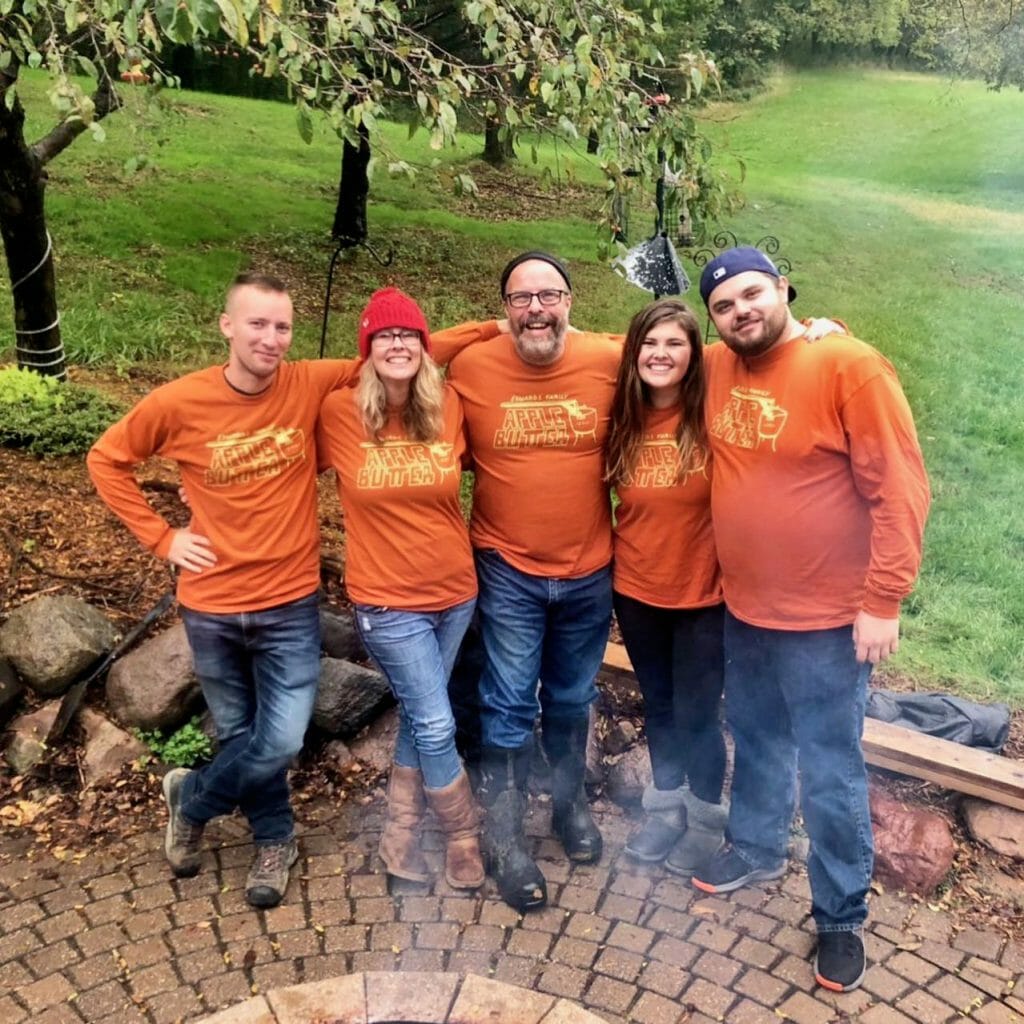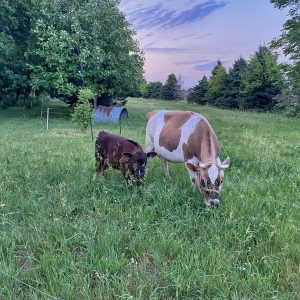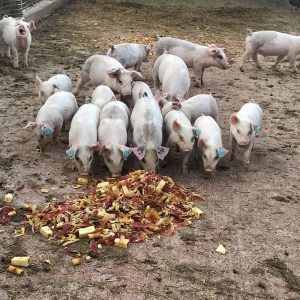Finding a Path Through Livestock and Mentors
Garin and Kristten Buttermore sought mentors to guide their new farm venture
The path to farming is increasingly varied. Many beginning and aspiring farmers enter the vocation citing the desire for a lifestyle change or value-based career shift as their main motivations.
Many of these beginners also did not grow up on a farm and face a steep learning curve. Because of this, some beginning farmers have turned to raising livestock as their entry into farming – and they are turning to experienced farmers for advice and support. Garin and Kristten Buttermore are two such beginners who came to farming as adults and have been helped by mentors along the way.
From City Life to Farm Life
Garin and Kristten decided to try start farming after purchasing their 7-acre home near Ogden from Garin’s uncle in 2015. During a pasture walk, they realized their land was most suitable for raising livestock rather than vegetables and in 2016, launched their small-scale livestock farm – which they named Uncle G’s farm – with free-range laying hens. They soon scaled up to include pastured meat birds, outdoor-raised pigs and a few cows. While many small-scale farms focus on raising vegetable crops, livestock can offer another avenue for those with a limited land base, either as a sole enterprise or as an addition to a specialty crop operation. Not only can livestock provide manure and weed control, farmers can also market value-added products like meat, soaps and lard.
“A good thing about mentors is you can ask them the dumb questions you’d be too shy to ask a stranger” – Garin Buttermore
Garin and Kristten both grew up in the Des Moines metro area – and both, along with their children, became curious about ways they could better sustain themselves off the land. “Even though we aren’t growing food for a ton of people, we still like to help our customers regain a connection to their food, as well as a connection to the land,” Garin says. At the outset, Garin and Kristten admit they were ambitious in their efforts to start raising livestock and all that entailed. With no prior farming background, the couple sought ways to connect with and learn from other farmers. Though they acknowledge they had much to learn, Kristten says jumping blind into farming has helped them to “look at and learn everything with fresh eyes. We had no preconceived notions on the right ways to do something.”
It Takes a Village
As they took their first steps to start farming, Kristten learned about and connected heavily with PFI. She and Garin attended beginning farmer socials and the PFI annual conference, then decided to apply for PFI’s Savings Incentive Program, a two-year program that pairs beginning and aspiring farmers with experienced farmer mentors. “SIP really helped to narrow and focus our farming efforts,” Garin says. “During those two years of learning the business side of farming, we realized the farmers market model wasn’t working for us.”
The Buttermores were paired with Phil Kramer as their SIP mentor, a fifth-generation hog farmer near Hardy who also works as a field agent for Niman Ranch. Because Garin and Kristten also market their outdoor-raised pigs to Niman Ranch, this connection was a double boon, giving the couple access to Phil’s deep farming knowledge as well as his connections within the Niman Ranch network. “Being a field agent for Niman Ranch has connected me with so many other hog farmers that I continue to learn from,” Phil says. “I used to visit with [PFI co-founder] Dick Thompson before he passed. We’d have great discussions on farrowing hut designs.”
“It’s on-the-ground knowledge and experience that can be communicated to you even if you don’t know what that is. What we have learned through our mentors and farmer friends adds to our confidence, and then we have the confidence to help other people.” – Kristten Buttermore

From left to right, Kyle Buttermore, Kristten Buttermore, Garin Buttermore, Katie Codner and Nathan Even pose on the Buttermores’ farm near Ogden. Not pictured but also involved in the farm, are Hunter Codner, Josh Meyers and Gabe Buttermore.
As the Buttermores’ mentor, Phil guided them to improve on some facets of their system they were already doing well that could help boost their profits. His main tip to other farmers searching for a farm mentor? Look for someone with experience. “See if they have been successful and have established cash flow and facilities,” Phil says. “Also look for someone who is open-minded and views things from different angles. Not every farm is the same. Not everyone’s skill level is the same – and everyone might not have the same equipment. You want to be able to mentor someone without being negative at all.”
Because a farm mentor is someone who can speak from experience, these people can serve as vital sounding boards for beginning farmers. Beyond helping newer farmers navigate through their farm challenges, farm mentors can share helpful tips and keep their mentees on track towards a focused goal. But it’s important to know that one mentor can’t be expected to answer every question or solve every farm challenge. Learning to farm successfully requires seeking out different points of view – especially when operating a diversified farm like the Buttermores’. Garin and Kristten knew this, and reached out to Kevin Dietzel, of Lost Lake Farm near Jewell. “Phil is our go-to on pig health protocol and Kevin is our cow guy,” Garin says. “I’ll call Kevin asking, if the calf isn’t feeding, what do I do?”
The Buttermores also readily acknowledge the role other mentors have played in helping them get to where they are today. “There are several others who have helped us in our farm decision-making – a community of mentors and supporters,” Garin says. “Most of the folks we turn to on a regular basis with questions or for support are PFI members.” For Garin and Kristten, these relationships – and the tangible network of support, encouragement and experience they represent – are at the heart of what distinguishes a mentor from other resources.
“In the beginning, we would YouTube and Google things a lot,” Garin says. “I can go to those sites and find out how to fix my forklift, but if I don’t know why it doesn’t work I don’t know what to search for. Now, I can follow up with our farmer friends, ask questions and they walk me through a solution.” Kristten adds: “It’s on-the-ground knowledge and experience that can be communicated to you even if you don’t know what that is. What we have learned through our mentors and farmer friends adds to our confidence, and then we have the confidence to help other people.”
Looking Towards the Future
Today, the Buttermores feel they have solidified their farming system and moved “a little past the beginning farmer stage.” But though they find themselves turning much less often to Google or YouTube, Garin says they “continue to rely on and check-in with our mentors and farmer friends if we don’t know something or need help. A good thing about mentors is you can ask them the dumb questions you’d be too shy to ask a stranger.”
Reflecting on their own farm journey with more experienced eyes now, Krissten and Garin emphasize to those just starting out the importance of starting small. “Don’t limit yourself and get two birds – but don’t overdo it and get 300,” Garin says. “Twenty is a good number to start with. Balance is key. You need enough livestock to know what the challenges are, but not so many that the challenges are too much to handle and the livestock suffer.”
Kristten offers this advice: “Build connections. You need to have people to connect with and learn from. We are fortunate to have started small, and have stayed small while we learn through our mistakes.”
The service their farm provides to their customers is a source of motivation for Garin and Kristten as they move into the next phase of their farming journey. “The feeling that people appreciate and value what we are doing, especially our customers, keeps us going,” Garin says, “as does maintaining our relationship to the farm, the animals we are raising and the land we live off of.”


